hyperthyroidism support
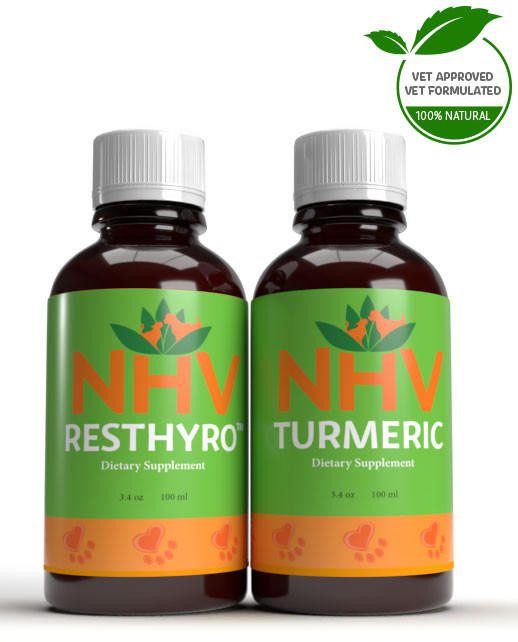
free shipping over $100 (USA & Canada)
1-877-937-4372 the pet expert hotline
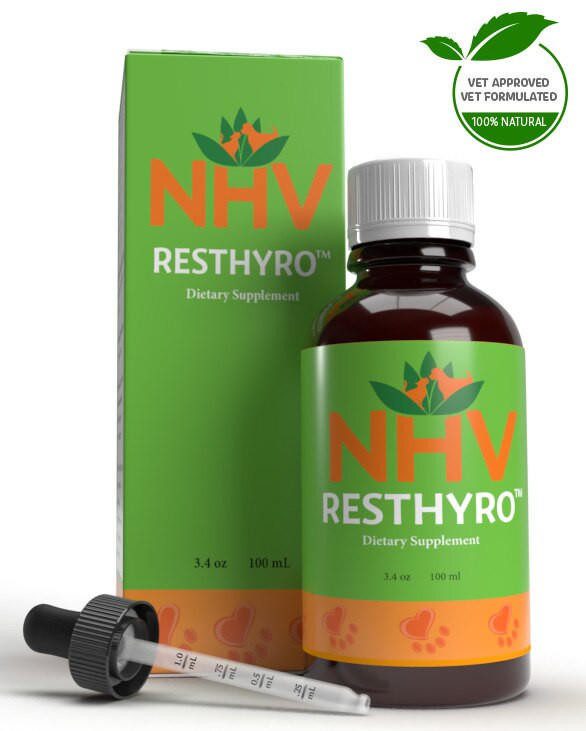
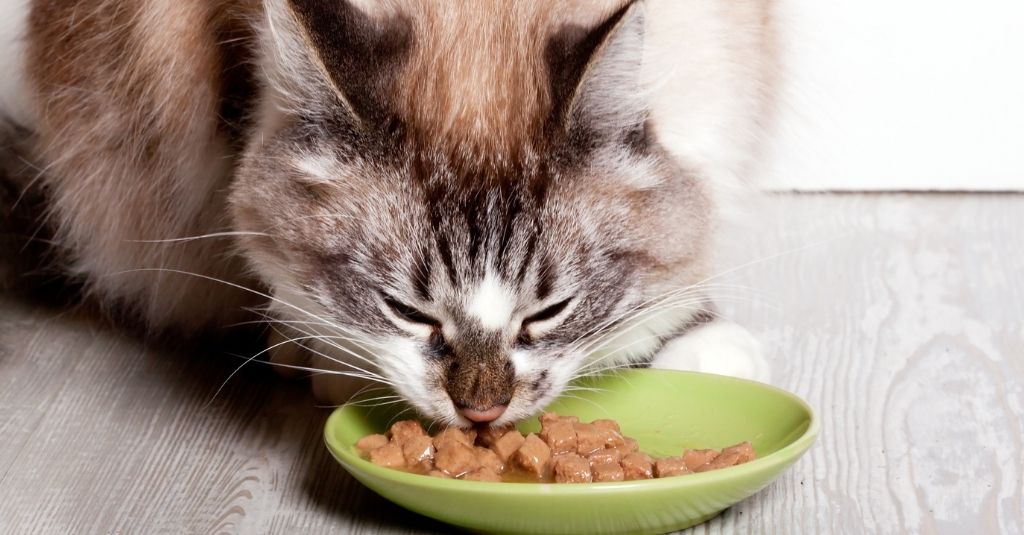
Hyperthyroidism is the most common endocrine disease in cats and can appear in any cat. It is caused by an excess of circulating thyroid hormones that result in a high metabolic state, which causes changes in many different body organs of your kitty. Finding the right diet for cats with hyperthyroidism can be helpful for managing the condition.
In most cats, the cause of this disorder is unknown, and it may be related to environmental, nutritional, or other factors. Your kitty can present weight loss, muscle wasting, decreased ability to jump onto objects, increased appetite, vomiting, increased thirst and urination, nervousness, hyperactivity, and increased vocalization.
The diagnosis is based on the measurement of a thyroid hormone (T4) in the blood. Treatment can consist of medical therapy, surgery, radiation therapy with radioactive iodine, and injection of the thyroid gland with ethanol, and changes in the diet.
Iodine is an element that is required for the thyroid gland to produce thyroid hormones and it is known to control thyroid function. Inadequate levels of iodine can lead to or worsen thyroid disease, as well as cause other significant health concerns.
A recent innovation in feline hyperthyroidism therapy is the introduction of a low iodine diet. However, this diet is recommended for kitties that can’t tolerate pills or are difficult to medicate, and for pet owners that cannot afford surgery or radiation.
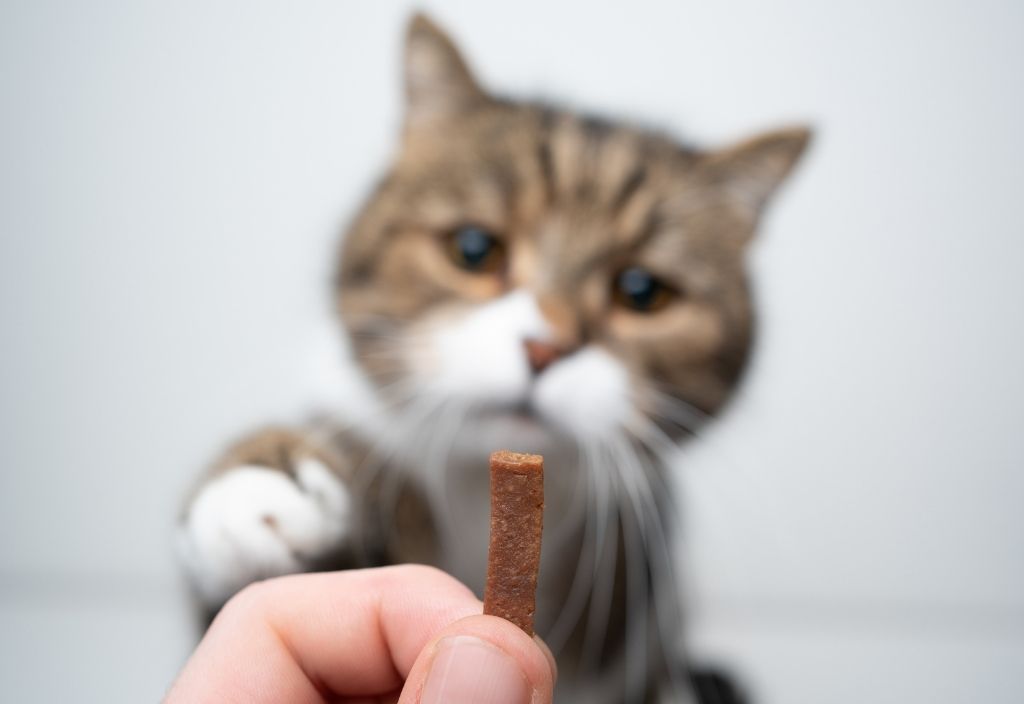
Nutritional therapy involves feeding a special diet with a restriction of iodine content to control the production of thyroid hormones. In some cases, an iodine-restricted diet controls feline hyperthyroidism.
Maintaining an iodine-restricted diet can be difficult for multiple reasons.
Maintaining an iodine-restricted diet can be difficult for multiple reasons. The pet on the diet cannot have anything other than their iodine-restricted food. That means no other foods, treats, or supplements, only the prescribed diet. Some cats can be very picky and may not like the taste of the diet. In addition, if you have other cats in the home, they can’t eat the iodine-restricted food unless they also suffer from hyperthyroidism. Iodine is an important component in the diet of healthy cats, they need it.
If your little one is on medication, a diet restriction in iodine is also important. So, avoid giving foods that are high in iodine such as seaweed, dairy, tuna, shrimp, eggs, and salt. It is important to talk with your vet before starting to feed your little one an iodine-restricted diet.
Natural supplements like NHV Resthyro also may be helpful for pets with hyperthyroidism that are not on a iodine-restricted diet. Resthyro is an herbal formula that helps balance thyroid hyperactivity and can relieve hyperthyroid-related symptoms such as excessive appetite, thirst, and urination. Also helps to relieve tension and irritability and aids with digestion.
No matter what your pet is going through, our team of pet experts including veterinarians, vet techs, and nutrition specialists are here to help. Ask our pet experts a question by using the chat button below.
hyperthyroidism support

Natural Support for Hyperthyroidism in Cats & Pets
bundle and save with pet expert kits
3 month supply for a small to medium size pet
A complete kit to support your pet through symptoms of hyperthyroidism.

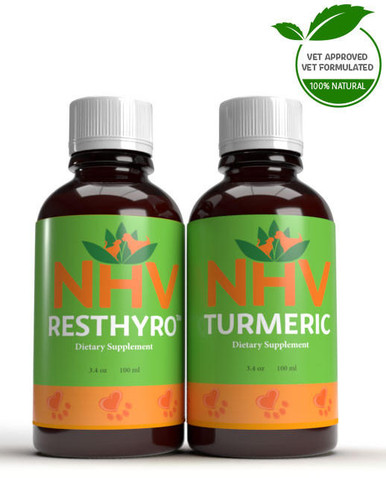
A complete kit to support your pet through symptoms of hyperthyroidism.

This supplement has been formulated combining several different herbs that are known to help control thyroid hormone production, and support heart circulatory and kidney function.
When using supplements to support hyperthyroidism it is important that the organs most affected by the condition are supported as well. Turmeric contains curcumin, which is a powerful antioxidant that makes it beneficial for discomfort and inflammation. Research has found that it is a powerful herb for heart health. It helps with hypertension, lowers bad cholesterol and supports both the heart and liver function. It is also beneficial in aiding digestion and diarrhea in cats and dogs.
Natural Support and can be used in conjunction with Vet-Prescribed Treatment of Hyperthyroidism in Cats
Hyperthyroidism is a common condition seen in middle-aged to older cats. This condition is exceedingly rare in dogs. Hyperthyroidism is caused when there is an overproduction of thyroid hormones T3 and T4. As the thyroid hormones control the function of nearly all the organs, it is common to see secondary health conditions such as heart disease, hypertension, and kidney disease.
With NHV’s Hyperthyroidism Gold Support Kit, you will get an effective blend of herbs that are safe to use long-term and are vet-recommended natural treatments for hyperthyroidism in cats. Find out how Penny improved her quality of life with NHV’s plant-based products.
Read more about hyperthyroidism medicine for cats on our blog at Vet Talk with Dr. Hillary Cook, because at NHV we want to support pet parents to help their fur babies in every way possible.
NHV’s Hyperthyroidism Gold Support Kit contains two potent blends of vet-formulated herbal supplements that may help support your cat’s thyroid as well as the overall function of the thyroid gland.
1.NHV’s Resthyro — A powerful blend of herbs that help control thyroid function as well as supporting heart circulation and kidney function make this a great additional support as well as being a vet-recommended natural support for hyperthyroidism in cats.
2.NHV’s Turmeric — A potent antioxidant and anti-inflammatory that contains curcumin, which is highly effective for discomfort and inflammation. This herb also aids in
Select your pet's weight to determine the correct dose.
To be taken twice daily. Determine your pet’s weight and then use the easy chart below to determine the correct dose. This is the minimum dosage.
Pet's Weight Dosage
0 - 15 lb = 0.5 ml
16 - 30 lb = 1.0 ml
31 - 45 lb = 1.5 ml
46 - 60 lb = 2.0 ml
61 - 75 lb = 2.5 ml
Over 75 lb = 3.0 ml
For small animals (rabbits, ferrets), avians and reptiles use 1 drop for every 2 lb of body weight.
How to Administer
Shake well before use. The easiest method is to use the dropper provided and place the drops into your pet’s food or favorite treat. You can also use the dropper and squirt directly into the pet’s mouth. Some pets can be finicky, if this occurs consider hiding the drops in foods most pet’s love such as fish, chicken or yogurt or a favorite treat. If your pet only eats dry food then soak a few kibbles at feeding time.
For Best Results
Herbal dietary supplements are beneficial to the health and well-being of your pet and are safe for long-term use. Every pet responds to natural herbal supplements differently, therefore it is important to be consistent and administer the product daily. Supplements generally take two to four weeks to take effect, however this will vary from one animal to the next.
Product Storage
All NHV Natural Pet Products are pure herbal extracts and contain no artificial additives, preservatives or coloring. Shelf life after opening is 6 months and must be refrigerated after opening.
Cautions and Contraindications
Do not use in pregnant or nursing animals.
All information provided by NHV Natural Pet Products is for educational purposes only.
This supplement has been formulated combining several different herbs that are known to help control thyroid hormone production, and support heart circulatory and kidney function.
When using supplements to support hyperthyroidism it is important that the organs most affected by the condition are supported as well. Turmeric contains curcumin, which is a powerful antioxidant that makes it beneficial for discomfort and inflammation. Research has found that it is a powerful herb for heart health. It helps with hypertension, lowers bad cholesterol and supports both the heart and liver function. It is also beneficial in aiding digestion and diarrhea in cats and dogs.
Natural Support and can be used in conjunction with Vet-Prescribed Treatment of Hyperthyroidism in Cats
Hyperthyroidism is a common condition seen in middle-aged to older cats. This condition is exceedingly rare in dogs. Hyperthyroidism is caused when there is an overproduction of thyroid hormones T3 and T4. As the thyroid hormones control the function of nearly all the organs, it is common to see secondary health conditions such as heart disease, hypertension, and kidney disease.
With NHV’s Hyperthyroidism Gold Support Kit, you will get an effective blend of herbs that are safe to use long-term and are vet-recommended natural treatments for hyperthyroidism in cats. Find out how Penny improved her quality of life with NHV’s plant-based products.
Read more about hyperthyroidism medicine for cats on our blog at Vet Talk with Dr. Hillary Cook, because at NHV we want to support pet parents to help their fur babies in every way possible.
NHV’s Hyperthyroidism Gold Support Kit contains two potent blends of vet-formulated herbal supplements that may help support your cat’s thyroid as well as the overall function of the thyroid gland.
1.NHV’s Resthyro — A powerful blend of herbs that help control thyroid function as well as supporting heart circulation and kidney function make this a great additional support as well as being a vet-recommended natural support for hyperthyroidism in cats.
2.NHV’s Turmeric — A potent antioxidant and anti-inflammatory that contains curcumin, which is highly effective for discomfort and inflammation. This herb also aids in
Select your pet's weight to determine the correct dose.
To be taken twice daily. Determine your pet’s weight and then use the easy chart below to determine the correct dose. This is the minimum dosage.
Pet's Weight Dosage
0 - 15 lb = 0.5 ml
16 - 30 lb = 1.0 ml
31 - 45 lb = 1.5 ml
46 - 60 lb = 2.0 ml
61 - 75 lb = 2.5 ml
Over 75 lb = 3.0 ml
For small animals (rabbits, ferrets), avians and reptiles use 1 drop for every 2 lb of body weight.
How to Administer
Shake well before use. The easiest method is to use the dropper provided and place the drops into your pet’s food or favorite treat. You can also use the dropper and squirt directly into the pet’s mouth. Some pets can be finicky, if this occurs consider hiding the drops in foods most pet’s love such as fish, chicken or yogurt or a favorite treat. If your pet only eats dry food then soak a few kibbles at feeding time.
For Best Results
Herbal dietary supplements are beneficial to the health and well-being of your pet and are safe for long-term use. Every pet responds to natural herbal supplements differently, therefore it is important to be consistent and administer the product daily. Supplements generally take two to four weeks to take effect, however this will vary from one animal to the next.
Product Storage
All NHV Natural Pet Products are pure herbal extracts and contain no artificial additives, preservatives or coloring. Shelf life after opening is 6 months and must be refrigerated after opening.
Cautions and Contraindications
Do not use in pregnant or nursing animals.
All information provided by NHV Natural Pet Products is for educational purposes only.
arthritis support
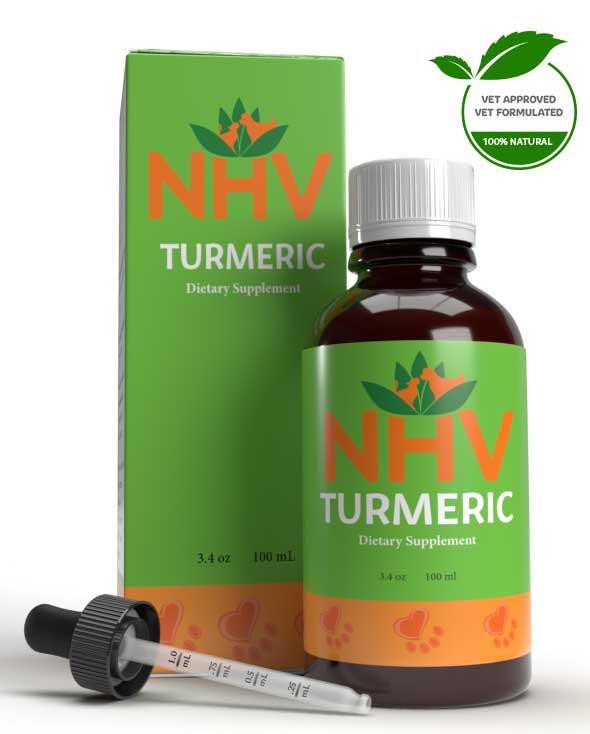
Support for Arthritis and Cancer
buy 2 and save $3
3 month supply for a small to medium size
From their tails to their whiskers, a cat’s body needs to be able to fight whatever comes their way - and not just the toys they like to chase, but health concerns too. NHV Turmeric for cats can be given to your furkiddos for a little extra TLC. This super herb offers support for a variety of conditions like cardiovascular issues, skin health, liver and kidney disease, arthritis, and overall well-being.
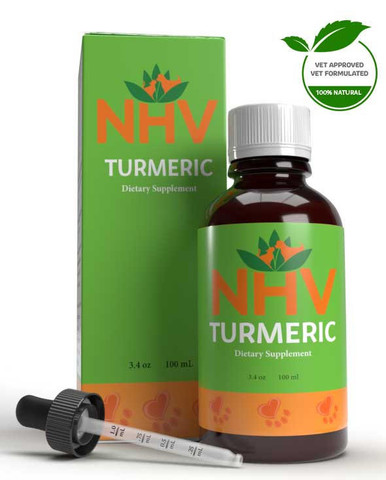
From their tails to their whiskers, a cat’s body needs to be able to fight whatever comes their way - and not just the toys they like to chase, but health concerns too. NHV Turmeric for cats can be given to your furkiddos for a little extra TLC. This super herb offers support for a variety of conditions like cardiovascular issues, skin health, liver and kidney disease, arthritis, and overall well-being.
Want to get your feline friend on a wellness-promoting supplement? Turmeric is an excellent choice - it’s well-tolerated by our whiskered furkiddos, and can offer them many benefits!
Benefits of Using Turmeric for Cats Daily
What goes into your cat’s body every day will make a difference when it is time to fight a disease, or when they already have one. That’s why NHV supplements are designed to be given each and every day for things like:
Joint Support: can be used for supporting cats with arthritis due to its anti-inflammatory properties.
Cancer Support: can cats with cancer use turmeric? Yes! Turmeric can be used as a companion supplement to veterinary care for cats who have cancer. In fact it can help scavenge for free radicals and is rich in antioxidants.
Discomfort Support: may help to ease discomfort related to inflammation, like the kind caused by arthritis, cancer, or other inflammatory conditions.
It can even be used proactively before your furry friend becomes sick in the first place by giving them a regular boost of natural goodness!
Healing Properties of Turmeric
Turmeric itself is a root with vibrant orange-golden flesh. It’s golden in the world of herbalism for pets with its many healing properties.
One of turmeric’s most well-recognized healing properties is its antioxidant content. Antioxidants can help scavenge for free radicals, which are unstable molecules that cause damage to the cells. The free radical scavenging properties of turmeric can support the body in processing and removing these molecules, minimizing the damage they can do.
Why Choose NHV Turmeric for Cats
At NHV, we are experts at harnessing the benefits of herbal ingredients specifically for your pets. When you choose NHV Turmeric, you’re choosing decades of holistic pet wellness experience from vets and herbalists. Our formula is:
Real Success Stories
We are proud to have been a part of many cats’ success stories over the decades. Check out this feline friend of ours, Willow, who has used our Turmeric for cats formula for comfort and wellness.
Willow’s Story: “I have no doubt that the supplements from NHV have been a huge part in maintaining her health and staving off the cancer that was found in late 2021”
Holistic Veterinarian Approves of Using Turmeric for Cats
Dr. Hillary, a holistic vet, writes an in-depth overview of Turmeric and why she believes turmeric can play a beneficial role in pet health. Read Dr. Hillary’s Turmeric overview here.
All NHV supplements are made with the finest quality organic or ethically harvested herbs. We use non-GMO vegetable glycerin as our base. NHV products are full-spectrum extracts.
Turmeric
Select your pet's weight to determine the correct dose.
To be taken twice daily. Determine your pet’s weight and then use the easy chart below to determine the correct dose. This is the minimum dosage.
Pet's Weight Dosage
0 - 15 lb = 0.5 ml
16 - 30 lb = 1.0 ml
31 - 45 lb = 1.5 ml
46 - 60 lb = 2.0 ml
61 - 75 lb = 2.5 ml
Over 75 lb = 3.0 ml
How to Administer
Shake well before use. The easiest method is to use the dropper provide and places the drops into your pet’s food or favorite treat. You can also use the dropper and squirt directly into the pet’s mouth.
Some pets can be finicky, if this occurs consider hiding the drops in foods most pet’s love such as fish, chicken or yogurt or a favourite treat. If your pet only eats dry food then soak a few kibbles at feeding time.
For Best Results
Herbal dietary supplements are beneficial to the health and wellbeing of your pet and are safe for long-term use. Every pet responds to natural herbal supplements differently, therefore it is important to be consistent and administer the product daily. Supplements generally take two to four weeks to take effect, however this will vary from one animal to the next.
Product Storage
All NHV Natural Pet Products are pure herbal extracts and contain no artificial additives, preservatives or coloring. Shelf life after opening is 6 months and must be refrigerated after opening.
Cautions and Contraindications: Do not use Turmeric in pregnant or nursing animals. Speak to your vet before using our products. A second visit is recommended if your pet’s condition does not improve, or deteriorates after continued use of the supplements.
Want to get your feline friend on a wellness-promoting supplement? Turmeric is an excellent choice - it’s well-tolerated by our whiskered furkiddos, and can offer them many benefits!
Benefits of Using Turmeric for Cats Daily
What goes into your cat’s body every day will make a difference when it is time to fight a disease, or when they already have one. That’s why NHV supplements are designed to be given each and every day for things like:
Joint Support: can be used for supporting cats with arthritis due to its anti-inflammatory properties.
Cancer Support: can cats with cancer use turmeric? Yes! Turmeric can be used as a companion supplement to veterinary care for cats who have cancer. In fact it can help scavenge for free radicals and is rich in antioxidants.
Discomfort Support: may help to ease discomfort related to inflammation, like the kind caused by arthritis, cancer, or other inflammatory conditions.
It can even be used proactively before your furry friend becomes sick in the first place by giving them a regular boost of natural goodness!
Healing Properties of Turmeric
Turmeric itself is a root with vibrant orange-golden flesh. It’s golden in the world of herbalism for pets with its many healing properties.
One of turmeric’s most well-recognized healing properties is its antioxidant content. Antioxidants can help scavenge for free radicals, which are unstable molecules that cause damage to the cells. The free radical scavenging properties of turmeric can support the body in processing and removing these molecules, minimizing the damage they can do.
Why Choose NHV Turmeric for Cats
At NHV, we are experts at harnessing the benefits of herbal ingredients specifically for your pets. When you choose NHV Turmeric, you’re choosing decades of holistic pet wellness experience from vets and herbalists. Our formula is:
Real Success Stories
We are proud to have been a part of many cats’ success stories over the decades. Check out this feline friend of ours, Willow, who has used our Turmeric for cats formula for comfort and wellness.
Willow’s Story: “I have no doubt that the supplements from NHV have been a huge part in maintaining her health and staving off the cancer that was found in late 2021”
Holistic Veterinarian Approves of Using Turmeric for Cats
Dr. Hillary, a holistic vet, writes an in-depth overview of Turmeric and why she believes turmeric can play a beneficial role in pet health. Read Dr. Hillary’s Turmeric overview here.
All NHV supplements are made with the finest quality organic or ethically harvested herbs. We use non-GMO vegetable glycerin as our base. NHV products are full-spectrum extracts.
Turmeric
Select your pet's weight to determine the correct dose.
To be taken twice daily. Determine your pet’s weight and then use the easy chart below to determine the correct dose. This is the minimum dosage.
Pet's Weight Dosage
0 - 15 lb = 0.5 ml
16 - 30 lb = 1.0 ml
31 - 45 lb = 1.5 ml
46 - 60 lb = 2.0 ml
61 - 75 lb = 2.5 ml
Over 75 lb = 3.0 ml
How to Administer
Shake well before use. The easiest method is to use the dropper provide and places the drops into your pet’s food or favorite treat. You can also use the dropper and squirt directly into the pet’s mouth.
Some pets can be finicky, if this occurs consider hiding the drops in foods most pet’s love such as fish, chicken or yogurt or a favourite treat. If your pet only eats dry food then soak a few kibbles at feeding time.
For Best Results
Herbal dietary supplements are beneficial to the health and wellbeing of your pet and are safe for long-term use. Every pet responds to natural herbal supplements differently, therefore it is important to be consistent and administer the product daily. Supplements generally take two to four weeks to take effect, however this will vary from one animal to the next.
Product Storage
All NHV Natural Pet Products are pure herbal extracts and contain no artificial additives, preservatives or coloring. Shelf life after opening is 6 months and must be refrigerated after opening.
Cautions and Contraindications: Do not use Turmeric in pregnant or nursing animals. Speak to your vet before using our products. A second visit is recommended if your pet’s condition does not improve, or deteriorates after continued use of the supplements.
Published: August 26, 2021